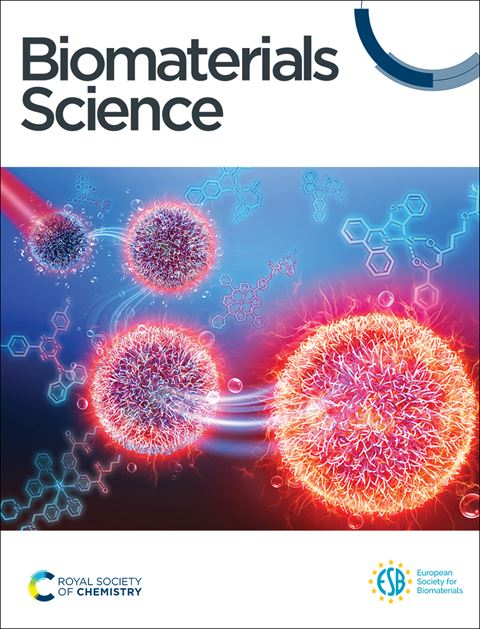用于递送 mRNA 的含聚山梨醇酯 80 的可电离脂质纳米颗粒
IF 5.8
3区 医学
Q1 MATERIALS SCIENCE, BIOMATERIALS
引用次数: 0
摘要
可电离脂质纳米颗粒作为 mRNA 疫苗载体取得了显著的成功,是最有前途的基因药物递送载体之一。然而,其主要成分之一的聚乙二醇(PEG)会引起免疫原性反应、过敏性休克并增加血液清除率,从而导致毒副作用和药效降低。在本研究中,我们利用聚山梨醇酯 80(PS80)作为 PEG 的替代品,配制出装载 eGFP mRNA 的可离子化脂质纳米粒子(PS80-iLNPs),旨在提高其隐身特性、吸收效率和生物安全性。我们的研究结果表明,PS80-iLNPs 提高了隐身性和抗血清干扰性。与含 PEG 的可电离脂质纳米颗粒(PEG-iLNPs)相比,PS80-iLNPs 的隐蔽性提高了 1.14 倍。此外,在总脂质浓度为 50 μg/mL 时,PS80-iLNPs 的细胞活力比 PEG-iLNPs 高 1.12 倍。值得注意的是,在血清干扰下,PEG-iLNPs 的吸收率降低了 44.97%,而 PS80-iLNPs 的吸收率仅降低了 30.55%,这表明 PS80-iLNPs 具有更强的抗血清能力。这项研究表明,PS80 可以作为 PEG 的合适替代品,从而为开发不含 PEG 的可离子化脂质纳米颗粒奠定了良好的基础。本文章由计算机程序翻译,如有差异,请以英文原文为准。
Polysorbate 80-containing ionizable lipid nanoparticles for mRNA delivery
Ionizable lipid nanoparticles have demonstrated remarkable success as mRNA vaccine carriers and represent one of the most promising gene drug delivery vehicles. However, polyethylene glycol (PEG), one of the major components, can cause immunogenic reactions, anaphylaxis and increase blood clearance, leading to toxic side effects and reduced efficacy. In this study, we utilize polysorbate 80 (PS80) as a PEG alternative in formulating eGFP mRNA-loaded ionizable lipid nanoparticles (PS80-iLNPs), aiming to enhance stealth properties, uptake efficiency, and biosafety. Our findings revealed that PS80-iLNPs enhanced the fraction of stealthiness and resist serum interference. Compared to PEG-containing ionizable lipid nanoparticles (PEG-iLNPs), PS80-iLNPs showed a 1.14-fold increase in stealthiness. Moreover, at a total lipid concentration of 50 μg/mL, PS80-iLNPs display 1.12 times higher cell viability compared to PEG-iLNPs. Notably, under serum interference, PEG-iLNPs showed a 44.97% uptake reduction, whereas PS80-iLNPs display a modest 30.55% decrease, underscoring superior serum resistance. This work demonstrated that PS80 could serve as a suitable substitute for PEG, thus signifying an excellent basis for the development of PEG-free ionizable lipid nanoparticles.
求助全文
通过发布文献求助,成功后即可免费获取论文全文。
去求助
来源期刊

Biomaterials Science
MATERIALS SCIENCE, BIOMATERIALS-
CiteScore
11.50
自引率
4.50%
发文量
556
期刊介绍:
Biomaterials Science is an international high impact journal exploring the science of biomaterials and their translation towards clinical use. Its scope encompasses new concepts in biomaterials design, studies into the interaction of biomaterials with the body, and the use of materials to answer fundamental biological questions.
 求助内容:
求助内容: 应助结果提醒方式:
应助结果提醒方式:


